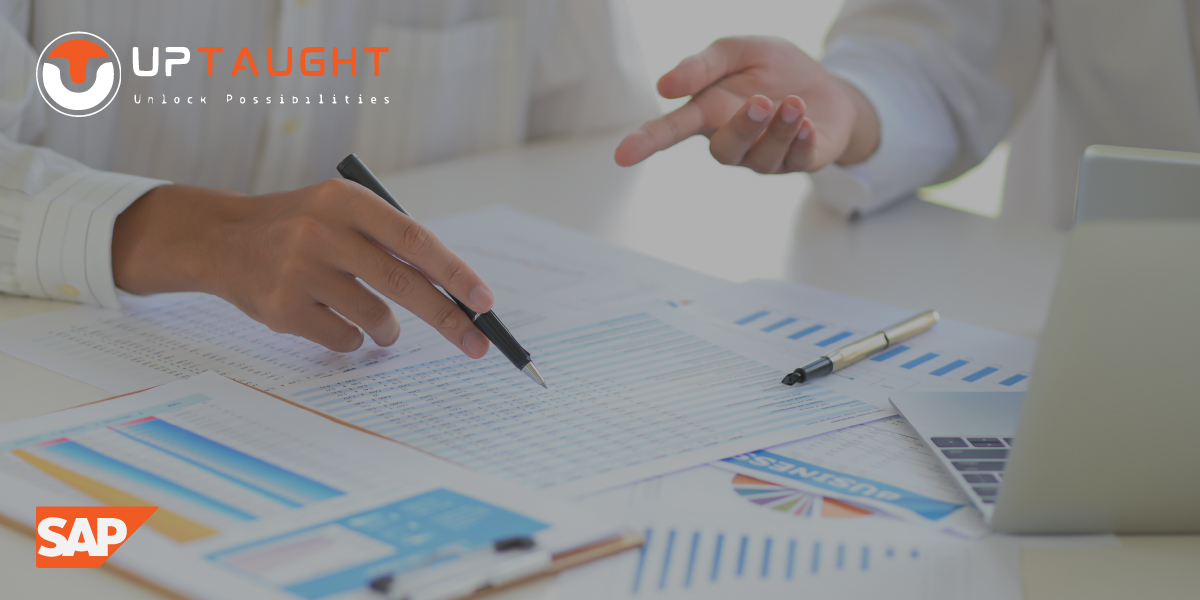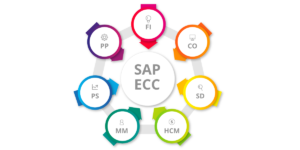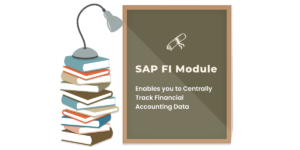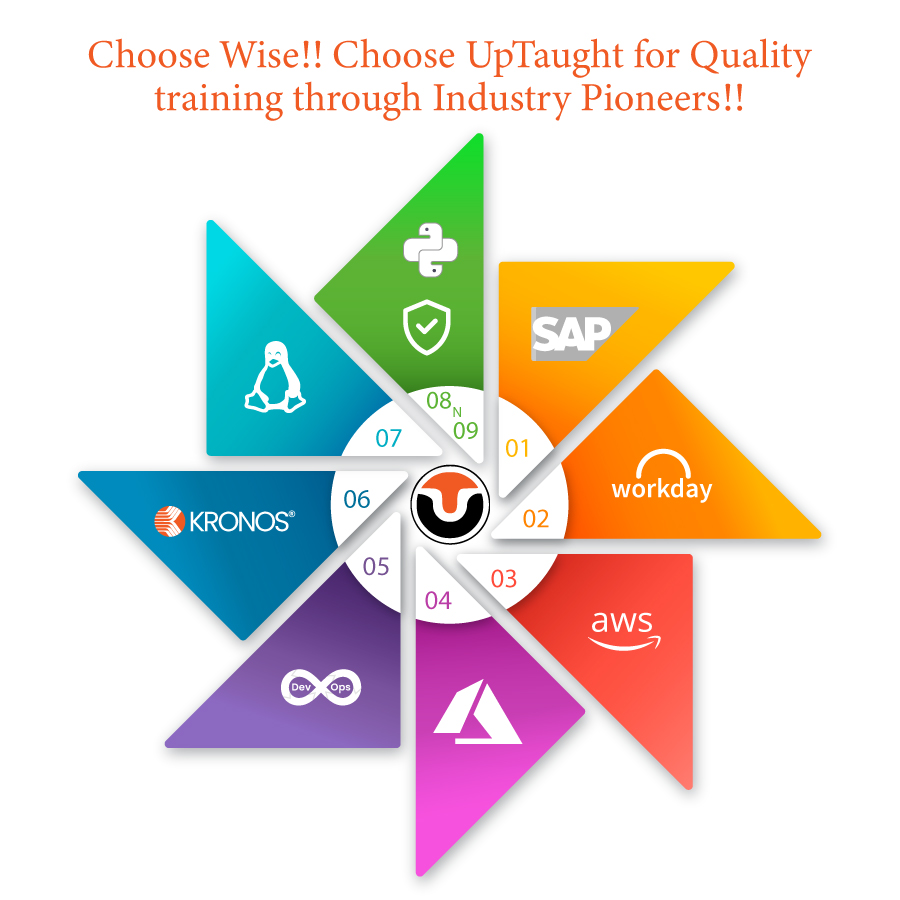In SAP FICO, SAP FI stands for financial accounting, and CO stands for Control. SAP FI is the backbone of SAP and helps to record, collect and process various financial transaction information in real-time. Using SAP Financial Accounting, you can extract the necessary data for external reports.
The SAP FI module can be tightly integrated with other SAP modules, such as SAP control (CO), material management (MM), sales and distribution (SD), human resources (HR), production planning, and various ERP modules.
SAP ERP Central Component (SAP ECC) is a primary Enterprise Resource Planning (ERP) system, usually referred to as “SAP ERP“. ECC software integrates digital information created in one business area with data collected from other areas of the same business on a real-time basis.
The SAP ECC module provides numerous transactions that allow organizations to manage key business functions focused on their specific needs.
Click here to visit our Course Page.
These modules are based on the industry so that the functions are also applicable to the public sector, oil and gas, transportation, etc. There are many modules available in ECC, we can share the following most popular modules:
Financial Accounting (FI): It is a functional module used to manage the most common financial reports processed internally and externally in the organization. It allows the use of its own chart of accounts, currency, and language to manage multiple companies in order to control the finances throughout the company.
Some of the subcomponents in FI are:
- General Ledger (FI-GL): One of the most important tasks is to manage the account and accounting functions of all transactions in the company’s different business areas. The GL module is responsible for the heavy work while ensuring that the data is accurate and complete.
- Accounts receivable and accounts payable (FI-AP and FI-AR): FI-AP and FI-AR are two primary elements of every business. In Accounts Receivable you can create a “Dunning Program” for the management of credit functionalities. They manage all transactions from transactions with suppliers or transactions resulting from transactions with customers are a core part of the business.
- Control (CO or FI-CO): CO is the primary repository of costs and revenues associated with each line of business within the organization. This module contains all transactions related to cost transactions, including the following sub-components:
- Profitability Analysis (CO-PA): This is a strategic tool that, as its name suggests, allows organizations to evaluate the profitability of different business lines or products offered to customers around the world.
- Human Capital Management (HCM): This module handles functions for human resources, allowing companies to deal with time management, recruitment, personnel costs, travel management, and other components, such as e-learning.
- Sales and Distribution (SD): In this module, users can view all information from placing an order to delivery, including sales order, pricing, packaging, shipping, and other information.
Click here to visit our Course Page.
This module also covers activities such as pre-sales tasks, scheduling, and billing to customers.
- Material Management (MM): This module manages inventory and purchasing functions, and can manage material and supplier master data, material demand planning, etc. The module also helps to track purchases, goods received, and storage.
ECC modules can communicate with each other allowing the organizations to fully control all different operations, and be able to obtain important reports from them.
- Bank Accounting: SAP Bank Accounting (FI-BA) sub-module manages bank transactions and cash management. This can be integrated with accounts payable and receivable, travel management, MM, SD, etc.
- Asset Accounting: The SAP Asset Accounting (FI-AA) sub-module superintends all activities of the organization’s assets, such as depreciation, insurance, etc. The FI-AA module can also be integrated with other SAP modules and sub-modules, such as general ledger, accounts receivable, control, MM module, PP module, etc. Therefore, asset accounting manages the financial activities from asset purchase to its final retirement or sale.
- Travel Management: The FI-TM sub-module manages all business travel activities of the organization. It can be integrated with accounts payable, SAP HCM, SAP control, etc. In FI-TM, you can manage travel requests, travel plans, and travel expenses.
Click here to visit our Course Page.
Since 2010, our global team of researchers has been studying SAP ERP ECC 6.0-Financial Accounting (FI) customers around the world, summarizing a large number of data points that form the basis of our forecasting assumptions, and perhaps some of the rise and fall of suppliers. Their products are once a quarter.
Every quarter, our research team will determine to purchase SAP ERP ECC 6.0-Financial Accounting (FI) from the public (press releases, customer references, testimonials, case studies, and success stories) and proprietary sources (including customer size, industry) For Financial Accounting’s company, location, implementation status, partner participation, the contact information of LOB key stakeholders and relevant IT decision-makers.
Companies that use SAP ERP ECC 6.0-Financial Accounting (FI) for financial accounting include Deutsche Post, a German professional services organization with 18,610 employees and $166.14 billion in revenue, and REWE-ZENTRALFINANZ eG, a German retail organization with 363,633 employees and revenue of USD 89.57 billion, Edeka, a German retail organization with 381,000 employees and USD 67.1 billion in revenue, ArcelorMittal Duisburg GmbH, a German manufacturing organization with 190,000 employees and USD 63.56 billion in revenue, Continental Reifen Deutschland GmbH, a German company manufacturing organization, with 2222 employees and $50 billion in revenue and many other revenues.
If you need to use SAP ERP ECC Financial Accounting (FI) for a complete and verified company list, including by industry (21 vertical industries), geography (region, country, state, city), company size (Income, employees, assets) and related IT decision-makers, major stakeholders, business and technical directors, responsible for purchasing ERP financial management software, then visit our courses.
SAP ERP ECC Financial Accounting (FI) customer success stories are extremely remarkable and embrace buyer insight and technographic customer database, which has more than 100 data fields and details the company’s use of the ERP financial management software system, and its digital transformation plan. Apps running the world- hope to be your number one source of technology market domain!
UpTaught definitely stands out due to its transparent results, cost-effectiveness, optimized customer support, and updated training and learning course materials, which are the reasons why we are on the ladder of an online learning platform.







